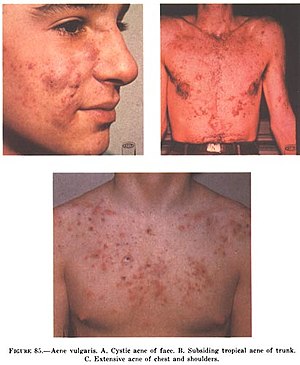 Image via Wikipedia
Image via Wikipedia
Acne is an inflammatory skin condition that causes spots.
Spots result from the build up of dead skin cells and grease that block the pores or hair follicles, typically on the face, upper arms, upper back and chest.
It is not contagious and is nothing to do with not being clean.
Hormonal changes, such as those related to puberty, menstruation and pregnancy, can contribute to acne.
Some medicines will also make it worse, including some contraceptive pills and steroids.
Who gets it?
Most people experience acne at some time in their lives, typically as young adults. Girls tend to develop it slightly earlier than boys - around the ages of 14-17 compared to 16-19 years, respectively.
Acne can occur later in life. Around five per cent of women and one per cent of men aged 25-40 continue to have acne after adolescence.
What are the symptoms?
As the pores of the skin become blocked, blackheads develop and small, tender, red spots appear. These can turn into pimples or whiteheads filled with pus.
What is the outlook?
Usually it is a mild condition, most commonly during young adulthood, and will resolve by itself. But for 15% of people it is severe.
The spots can become infected and cause significant scarring, particularly if they are scratched or squeezed.
How can it be treated?
Mild acne does not need treating as each inflamed spot will eventually heal. Eating a healthy diet and drinking plenty of water will help keep the skin healthy.
Keeping spot-prone areas clean by washing the affected area twice daily with an unperfumed cleanser can help. However, excessive washing and scrubbing of the skin will not help and may make the inflammation worse.
More severe acne may need treatment. The aim is to clear the spots and prevent scarring.
Treatments work by either unblocking blocked pores, reducing the amount of grease or sebum made by the skin, reducing the inflammation or fighting the bacterium that infects the lesions.
Creams, gels and lotions that can be applied to the skin are available to buy at pharmacies without a prescription. These usually contain antibacterial agents such as benzoyl peroxide, which also works by drying out the skin and encouraging it to shed the surface layer of dead skin.
There are several more potent oral tablets that can be prescribed by a doctor if the acne persists.
Make-up can be used to cover blemishes but heavy use of concealer may make acne worse.
Any scarring will improve with time. Laser therapy, chemical peels, dermabrasion and other treatments have been suggested for acne scarring.
Acne can be extremely distressing and it is important to seek help if you are anxious or depressed about it.
source:
BBC.co.uk
![Reblog this post [with Zemanta]](http://img.zemanta.com/reblog_e.png?x-id=7812f565-f1d5-473b-8232-6da2011ecf7b)





















Those are great tips to prevent back acne as well. I want to also just reasure anyone suffering with acne or body acne is that it won't always be there. There will come a time when your acne will be a problem solved.
ReplyDeletehaving back acne is really difficult, it worsens because we sweat a lot on our backs, which is the best time the acne forms. However, there are a lot of treatments available but we don't know which one would work effectively.
ReplyDeleteBetter choose a product that contains natural elements but doesn't contain harsh chemicals.
I had acne growing up and was awful to deal with. In the end doctors prescribed Roacatane.
ReplyDeleteThis cleared up the Acne with a few months and my confidence has never been better since!!!